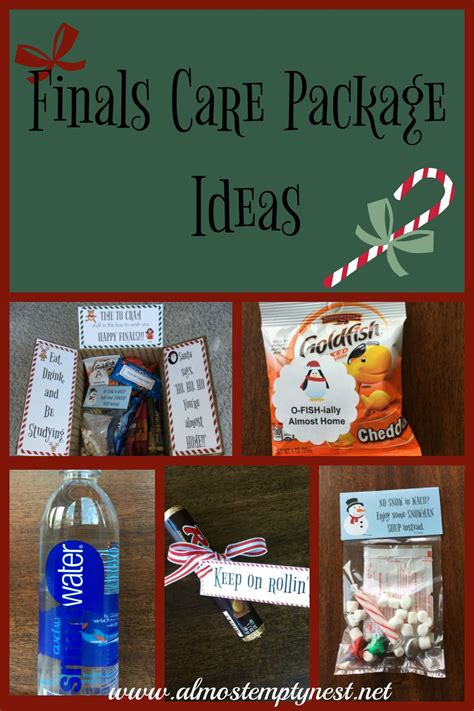As the D-day for your final exams draws closer, it’s natural to feel a surge of anxiety and stress. However, with the right preparation and a comprehensive care package, you can confidently navigate this academic challenge and achieve success. Here’s a comprehensive guide to help you assemble an effective final exam care package:

1. Plan and Prioritize
- Create a Study Schedule: Allocate specific time slots for each subject, focusing on the most challenging topics first. Stick to the schedule as much as possible, allowing for breaks and flexibility.
- Identify High-Yield Material: According to the National Survey of Student Engagement (NSSE), students who focus on key concepts and practice exam-like questions perform better. Review course notes, textbooks, and past papers to identify these areas.
- Break Down Large Tasks: Divide voluminous material into smaller, manageable chunks. This approach makes learning less overwhelming and helps you retain information effectively.
2. Gather Resources
- Textbooks and Class Notes: These are essential sources for reviewing course material. Highlight key points, take notes, and annotate textbooks to enhance memorization.
- Practice Exams: Practicing with mock exams or previous exam papers simulates the actual exam experience, helping you familiarize yourself with the format and test your understanding.
- Online Resources: Utilize online platforms and databases for supplemental materials, such as practice questions, videos, and virtual flashcards.
3. Foster Good Habits
- Adequate Sleep: Aim for 7-9 hours of quality sleep each night to enhance memory consolidation and reduce stress levels.
- Healthy Diet: Nourish your body with nutrient-rich foods that support brain function. Avoid sugary treats and processed junk food in favor of fruits, vegetables, and lean proteins.
- Regular Exercise: Physical activity releases endorphins that improve mood and reduce anxiety. Engage in activities you enjoy, such as walking, cycling, or swimming.
4. Seek Support
- Study Groups: Collaborate with classmates to review material, engage in discussions, and quiz each other. This provides diverse perspectives and helps reinforce learning.
- Professors and Tutors: Don’t hesitate to reach out to your professors or teaching assistants for clarification on concepts or guidance during office hours.
- Counseling Services: Many colleges offer counseling services to help students cope with stress, anxiety, and academic challenges.
5. Create a Positive Mindset
- Visualize Success: Picture yourself performing well on the exam and achieving positive outcomes. Positive visualization can boost your confidence and reduce pre-exam jitters.
- Affirmations: Repeat positive statements to yourself, such as “I am prepared” or “I will succeed.” This helps reinforce your belief in your abilities.
- Celebrate Your Progress: Acknowledge your hard work and progress throughout the exam period. Small rewards for accomplishments can provide motivation and keep you on track.
6. Practice Self-Care
- Take Breaks: Schedule regular breaks throughout your study sessions to prevent burnout and improve focus. Step outside, listen to music, or engage in other relaxing activities.
- Mindfulness and Meditation: Practice mindfulness techniques to reduce stress and increase concentration. Engage in short meditation sessions to clear your mind and improve your overall well-being.
- Avoid Distractions: Create a distraction-free study environment. Turn off notifications, find a quiet place, and minimize noise levels to enhance your focus.
7. Additional Resources
Table 1: Time Management Strategies
| Strategy | Description |
|---|---|
| Pomodoro Technique | Break down study sessions into 25-minute intervals, followed by 5-minute breaks. |
| Eisenhower Matrix | Categorize tasks based on urgency and importance, focusing on completing high-priority tasks first. |
| Active Recall | Regularly test your memory by recalling information without looking at notes. |
| Spaced Repetition | Review material at increasing intervals to improve long-term retention. |
Table 2: Study Environment Tips
| Factor | Recommendation |
|---|---|
| Lighting | Use natural light or bright artificial lighting to enhance alertness. |
| Temperature | Maintain a comfortable room temperature around 68-72 degrees Fahrenheit. |
| Ergonomics | Use a comfortable chair and desk to prevent physical discomfort and improve posture. |
| Noise Level | Minimize noise distractions by using earplugs or headphones with noise-canceling features. |
| Decor | Surround yourself with positive and motivating images or quotes. |
Table 3: Nutrition for Exam Success
| Food Group | Benefits |
|---|---|
| Fruits and Vegetables | Rich in antioxidants and vitamins to support brain function. |
| Lean Proteins | Provide sustained energy and improve concentration. |
| Whole Grains | Release energy slowly and support stable blood sugar levels. |
| Healthy Fats | Found in nuts, seeds, and avocados, support memory and cognitive function. |
| Water | Essential for hydration and overall well-being. |
Table 4: Relaxation Techniques
| Technique | Benefits |
|---|---|
| Deep Breathing | Calms the nervous system and reduces stress. |
| Progressive Muscle Relaxation | Releases tension by sequentially tensing and relaxing different muscle groups. |
| Yoga and Tai Chi | Promote relaxation and improve flexibility. |
| Nature Walks | Exposure to nature reduces anxiety and improves mood. |
| Music Therapy | Listening to calming music can soothe the mind and promote relaxation. |
